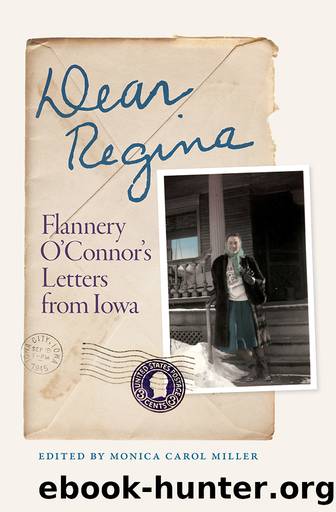Dear Regina by Monica Carol Miller

Author:Monica Carol Miller
Language: eng
Format: epub
Publisher: University of Georgia Press
Published: 2022-10-15T00:00:00+00:00
* * *
1. âThe Geraniumâ would be published in Accentâs Summer 1946 issue.
Academic Year 1946â1947
During her second year at Iowa, Flanneryâs letters generally become shorter and less chatty than her first year. The Flannery in these letters is one focused on work, honing her craft, and finding a job. Many letters describe the placement agencies that Flannery contacts, dreading a future of teaching, hoping for an opportunity that will allow her to continue focusing on her writing. The contacts she makes during this period become invaluable resources both during her graduate school career as well as in her future writing career. One of the agencies she contacts, for example, is recommended by Robert Penn Warren, who during this time had just finished his tenure as the Consultant in Poetry to the Library of Congress (later termed U.S. Poet Laureate) and would publish his Pulitzer Prizeâwinning novel, All the Kingâs Men. She also works with Allen Tate, one of the group of Vanderbilt academics who self-identified as the Agrarians and with whom Warren had collaborated on the 1930 manifesto Iâll Take My Stand. About Tate, Flannery notes that âMy admiration for him is extremeâ (23 Apr. 1947).
Both Warren and Tate would continue to be important mentors to Flannery, instrumental in helping her find literary representation, for example. Tateâs wife, author Caroline Gordon, would be a close friend and correspondent throughout Flanneryâs writing life, providing significant feedback on Flanneryâs early short stories (see Flanagan, The Letters of Flannery OâConnor and Caroline Gordon). Flanneryâs characterizations of the writers she is meeting are often notable, especially in the way that she describes them for Regina. When recounting meeting poet Robert Lowell, for example, she describes him first as âthe Catholic convert,â and only second as âthis yearâs Pulitzer Prize poetâ (5 Oct. 1947). By the end of the academic year, she graduates with a masterâs in fine arts; she has also won the prestigious Iowa-Rinehart Award and is planning to return in the fall to continue her work with her mentors at Iowa, supplemented by a fellowship.
It is also during this time that Regina inherits the family farm, Andalusia, from her brother, Dr. Bernard Cline, who originally purchased the farm in the early 1930s as a weekend getaway from his home in Atlanta. Hiring workers to operate the farm as he expanded his acreage, Cline trained his sister to keep the books for what by the 1940s was a growing, productive farm. When Bernard Cline died in 1947, he left the farm jointly to his sister Regina and their brother, Louis. Regina and Louis expanded the operation, managing two hundred acres of pasture and several hayfields while keeping the rest of the property for timbering. As Louis continued to work and live in Atlanta, the day-to-day operations of the farm fell primarily to Regina in the 1950s and 1960s. After Louisâs death in 1973, Regina became the farmâs sole owner until her death in 1995 (âAndalusiaâ).
As noted in the introduction, Flannery expresses concern for the difficulties she expects her mother to face in taking on the management of the farm.
Download
This site does not store any files on its server. We only index and link to content provided by other sites. Please contact the content providers to delete copyright contents if any and email us, we'll remove relevant links or contents immediately.
| Diaries & Journals | Essays |
| Letters | Speeches |
The Rules Do Not Apply by Ariel Levy(3929)
Bluets by Maggie Nelson(3739)
Too Much and Not the Mood by Durga Chew-Bose(3707)
Pre-Suasion: A Revolutionary Way to Influence and Persuade by Robert Cialdini(3437)
The Motorcycle Diaries by Ernesto Che Guevara(3360)
Walking by Henry David Thoreau(3244)
What If This Were Enough? by Heather Havrilesky(2952)
The Day I Stopped Drinking Milk by Sudha Murty(2874)
Schaum's Quick Guide to Writing Great Short Stories by Margaret Lucke(2818)
The Daily Stoic by Holiday Ryan & Hanselman Stephen(2721)
Why I Write by George Orwell(2374)
Letters From a Stoic by Seneca(2345)
The Social Psychology of Inequality by Unknown(2329)
A Short History of Nearly Everything by Bryson Bill(2148)
Feel Free by Zadie Smith(2121)
Insomniac City by Bill Hayes(2094)
A Burst of Light by Audre Lorde(1987)
Upstream by Mary Oliver(1958)
Miami by Joan Didion(1888)
